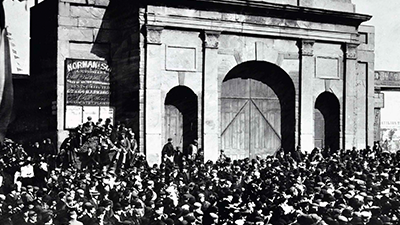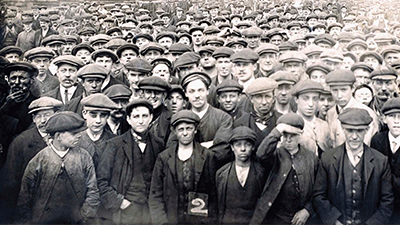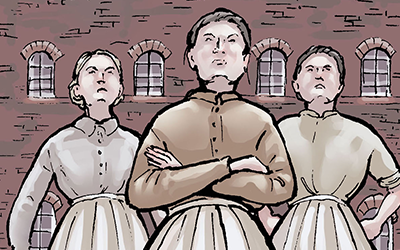Economic Systems and the Working Class
Driving Question: How did workers respond to the changes of industrialization?
As industrialization spread, it transformed societies. Industrial capitalism enriched some, but many others struggled in the face of industrial changes. A new urban working class—people paid an hourly wage in exchange for their labor—emerged. Living and working conditions were often miserable. As a result, new economic ideologies, like socialism, emerged to challenge capitalism. In many places, the working class united to demand better pay and working conditions.
Learning Objectives:
- Compare and contrast the economic systems of capitalism and socialism.
- Evaluate how different groups responded to increasing industrialization from c. 1750 to 1900 CE.
- Use a graphic biography to support, extend, or challenge the overarching narratives of this period.
Vocab Terms:
- activist
- feminist
- middle class
- proletariat
- reform
- socialism
- suffrage
Economic Systems and the Working Class
To teach this lesson step, refer to page 2 of the Lesson 5.5 Teaching Guide.
Want to connect with other World History teachers? Join the OER Project Community forum.
The Industrial Revolution upended the organization of human communities, but some things remained consistent. Compare the social pyramids of medieval and industrial society to see what changed.
Pyramids of Capitalism
The Working Class
To teach this lesson step, refer to page 3 of the Lesson 5.5 Teaching Guide.
Teachers in the OER Project Community forum share their experiences with simulations in the classroom.
When there’s a huge difference between the “haves” and the “have-nots,” there are bound to be problems. In this activity and article, you’ll examine the causes of this divide and see how people responded.
-
Guiding Questions
-
Before you read
Preview the questions below, and then skim the article. Be sure to look at the section headings and any images.
While you read
Look for answers to these questions:
- In the long nineteenth century, what inspired different groups of social reformers in the United States and Britain?
- How did Lucretia Mott and Elizabeth Cady Stanton’s experiences as abolitionists lead them to become advocates for the rights of women?
- What did Upton Sinclair’s The Jungle reveal to many Americans? What was one result of their outcry?
- Jacob Riis wrote about terrible conditions in New York’s tenements. To what reforms did his work contribute?
- Across this period, what kinds of reforms affected children’s lives in particular?
After you read
Respond to this question: Why do you think the first reform movements were concentrated in New York and the cities of Britain?
Challenging Industrial Capitalism
To teach this lesson step, refer to page 6 of the Lesson 5.5 Teaching Guide.
Looking for tips on using video in an instructionally sound way? Look no further than the OER Project Video Guide.
The growing pains of industrial capitalism gave rise to a new economic system that sought reforms. These resources examine the emergence of a working class and socialism.
-
Guiding Questions
-
Before you watch
Preview the questions below, and then review the transcript.
While you watch
Look for answers to these questions:
- How did industrial capitalism change production?
- What are some features of capitalism as a cultural system?
- What were some shortcomings of industrial capitalism in the nineteenth century?
- Where did socialism begin as an “intellectual construct”?
- What were Karl Marx’s main arguments?
After you watch
Respond to this question: How did people in the nineteenth century think socialism would improve the negative effects of industrial capitalism?
Key Ideas
-
Guiding Questions
-
Before you read
Preview the questions below, and then skim the article. Be sure to look at the section headings and any images.
While you read
Look for answers to these questions:
- What are the means of production, and how did controlling them make industrialists powerful?
- Why did industrialists begin to hire women, and what were their experiences?
- What is the proletariat?
- How did workers begin to organize into alliances like unions, and what were their principal tactics?
- Why was there less union organizing in the colonies?
After you read
Respond to these questions: Do you think there is still a proletariat class today? What evidence supports your answer?
Closer: Economic Systems and the Working Class
To teach this lesson step, refer to page 8 of the Lesson 5.5 Teaching Guide.
This blog post, “History Stories and Comics”, highlights the use of graphic histories to elevate the lives of everyday individuals often lost in traditional history.
Read a graphic biography about an industrial worker and consider how she would reflect on the changes of the Industrial Revolution.
Economic Theories
To teach this lesson step, refer to page 9 of the Lesson 5.5 Teaching Guide.
During the nineteenth century, some folks, particularly wealthy industrialists, benefited big-time, while others, mainly workers, not so much. Is it any wonder that many started to have different ideas about who got what—and how much?











